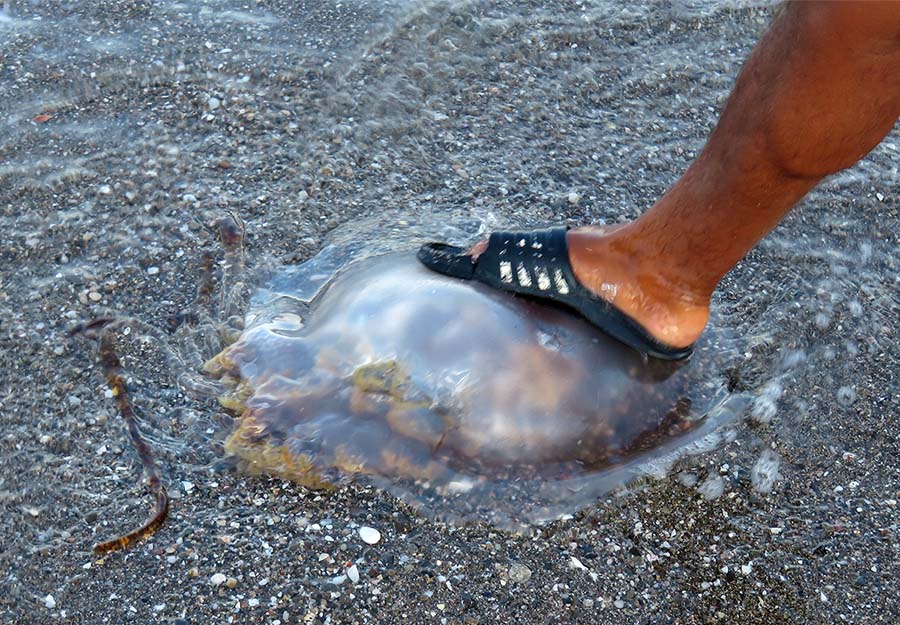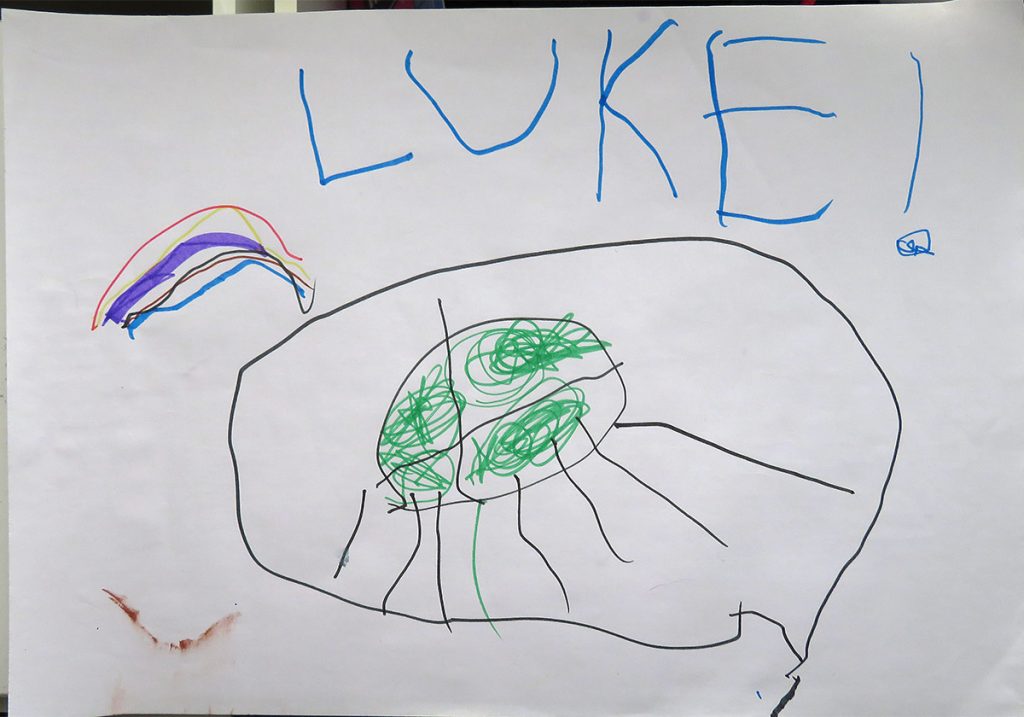La versión español está después de la versión inglés.
A COUPLE OF weeks ago, I was on the beach with my pal Luke, his little brother, and their parents when we noticed that a very large jellyfish had washed up. A man was closely examining it and, since we didn’t know what type of jellyfish it was, Kathleen asked the man (in Spanish). “What is it?” “A medusa,” was his response. That’s what locals tend to call all jellyfish. So, Kathleen continued, “Is it Portuguese (I suppose wondering if it was a Portuguese Man of War).” But the man laughed and replied, “No, it’s Spanish.”
It became obvious the jellyfish was dead. Luke found it fascinating and, since we didn’t know anything about it, we explained the potential dangers of jellyfish. Meanwhile, the man tried to push it back into the water, which caused part of it to flop onto his bare foot. We gasped, but nothing happened.
I’ve done some research and I think I’ve figured out what kind it was. Rhizostoma luteum. It was once thought to be rare but scientists then determined that it was being misidentified as other rhizostomas (there are three species). Although it’s more common than it was thought to be, it doesn’t appear to have a common name. Then again, Rhizostoma luteum DOES flow off the tongue. I’ve read that their sting is not NORMALLY harmful to humans, but it’s best to keep your distance. (NO KIDDING!) And, as we had already explained to Luke, jellyfish can still sting even if they’re dead.
I suggested to Luke that we could take it home and have peanut butter and jellyfish sandwiches. He laughed and rolled his eyes. He’s not yet 4, but he gets me.
.
HACE DOS SEMANAS, estaba en la playa con mi amiguito Luke, su hermanito, y sus padres cuando notamos que había una medusa muy grande. Un hombre lo estaba examinando detenidamente y, dado que no sabíamos qué tipo de medusa era, Kathleen le preguntó al hombre (en español). “¿Qué es?” “Una medusa”, fue su respuesta. Eso es lo que los lugareños suelen llamar medusas. Entonces, Kathleen continuó: “¿Es portugués?” (supongo que me pregunto si fue una carabela portuguesa). Pero el hombre se rió y respondió: “No, es una española”.
Se hizo evidente que la medusa estaba muerta. Luke lo encontró fascinante y, como no sabíamos nada al respecto, explicamos los peligros potenciales de las medusas. Mientras tanto, el hombre intentó empujarlo de vuelta al agua, lo que provocó que parte de él cayera sobre su pie descalzo. Nos quedamos sin aliento, pero no pasó nada.
He investigado un poco y creo que he descubierto de qué tipo era. Rhizostoma luteum. Alguna vez se pensó que era raro, pero los científicos determinaron que se estaba identificando erróneamente como otros rizostomas (hay tres especies). Aunque es más común de lo que se pensaba, no parece tener un nombre común. Por otra parte, Rhizostoma luteum fluye de la lengua. He leído que su picadura no es “NORMALMENTE” perjudicial para los humanos, pero es mejor mantener la distancia. (¡NO HAY RODAJE!) Y, como ya le habíamos explicado a Luke, las medusas aún pueden picar incluso si están muertas.
Le sugerí a Luke que nos lo lleváramos a casa y comiéramos bocadillos de crema de cacahuete y medusa (en inglés, una medusa es un “jellyfish” que significa un pez de mermalada). Luke se rio y puso los ojos en blanco. Todavía no tiene 4 años, pero me entiende.

OK. El hombre tenía pies pequeños, ¡pero eso todavía era una gran medusa! Más grande que los pies de San Geraldo.

Como todos repetimos, “No muy cerca”.


Mi “LUKE!” original: la medusa (con un arcoíris). Y escribió su nombre completamente solo. ¡Incluyendo el signo de exclamación! Esto vino con una nota que él dictó que me agradeció por los regalos que traje de Nueva York para él y su hermanito.


I’ve never seen one in person outside of aquariums.
Adam:
I saw them in the Atlantic Ocean when I was a kid but not like this one.
I second adam. and what a nice thank you note from clever luke!
anne marie:
I used to see small jellyfish swimming in Brighton Beach and Coney Island. That was creepy and disgusting enough. I’ve seen a lot more varieties… some very scary… and in huge numbers around here.
Seeing the jellyfish in pictures is close enough for me.
Bob:
It would be for me, too. They’re not always around, but sometimes the water is teeming with them and warning flags are up. It really creeps me out.
I have run into them on the beaches in Florida a couple of times, unpleasant to encounter when swimming,
David:
I do worry about them and a always on the lookout.
Since Nova Scotia is almost completely surrounded by water, I have grown up with these critters and learned when I was around your friend’s age (Luke) that they are to be approached carefully. Some have very long tentacles that trail behind them that you cannot see…..got me a few times! …….stings to high heavens!!
Never tried PB and jellyfish come to think of it!! lol
Jim:
I’m really afraid of being stung. I’ve been told “Ah, it’s no more dangerous than a bee sting.” I’m allergic to bee stings!
Ick.
Deedles:
Ditto.
“Peanut butter and jellyfish sandwich” — GRRROOOAAANNN! Good one!
Debra:
Yeah, Luke kind of groaned, too. I got a million of ’em.
“Then again, Rhizostoma luteum DOES flow off the tongue”
Haaaaaaaaaaaaa!
Judy:
Imagine THAT flowing off the tongue.
I really yucky PB&J….my husband didn’t ever know what that term was until he met me BTW…apparently he has lived under a rock his entire life.
Cheapchick:
Your husband and SG might have been neighbors.
Looks like one of those monsters that chase Pac-Man
Kirk:
That’s good. You’re right.
Looks like an alien from outer space
Kirk:
Ha. Isn’t that what the monster from PacMan is supposed to be?
I obviously can’t make up my mind what it looks like
He’s a pac-man monster from outer space and he’s bad! Everybody sing !
Deedles:
Hit it Lorelei!
Kirk:
Luke would probably say it looks like a jellyfish.
For me it is always so sad to see something so delicate and beautiful to be washed up on the shore. I have been stung by jellyfish is my much younger surfing years.
parsnip
Parsnip:
I’m so afraid of being stung by jellyfish. I’m allergic to bee stings and insect bites. I’d expect the worst reaction.
That thing is HUGE!
That’s what SHE said!
Deedles:
Or HE said.
Mistress Maddie:
He exclaimed joyfully.
I suppose the jelly- jellyfish pun is a bit lost when done in Spanish.
Urspo:
Yep. So much is lost in translation. I try to explain the puns but even if the explanation works the “funny” is gone.